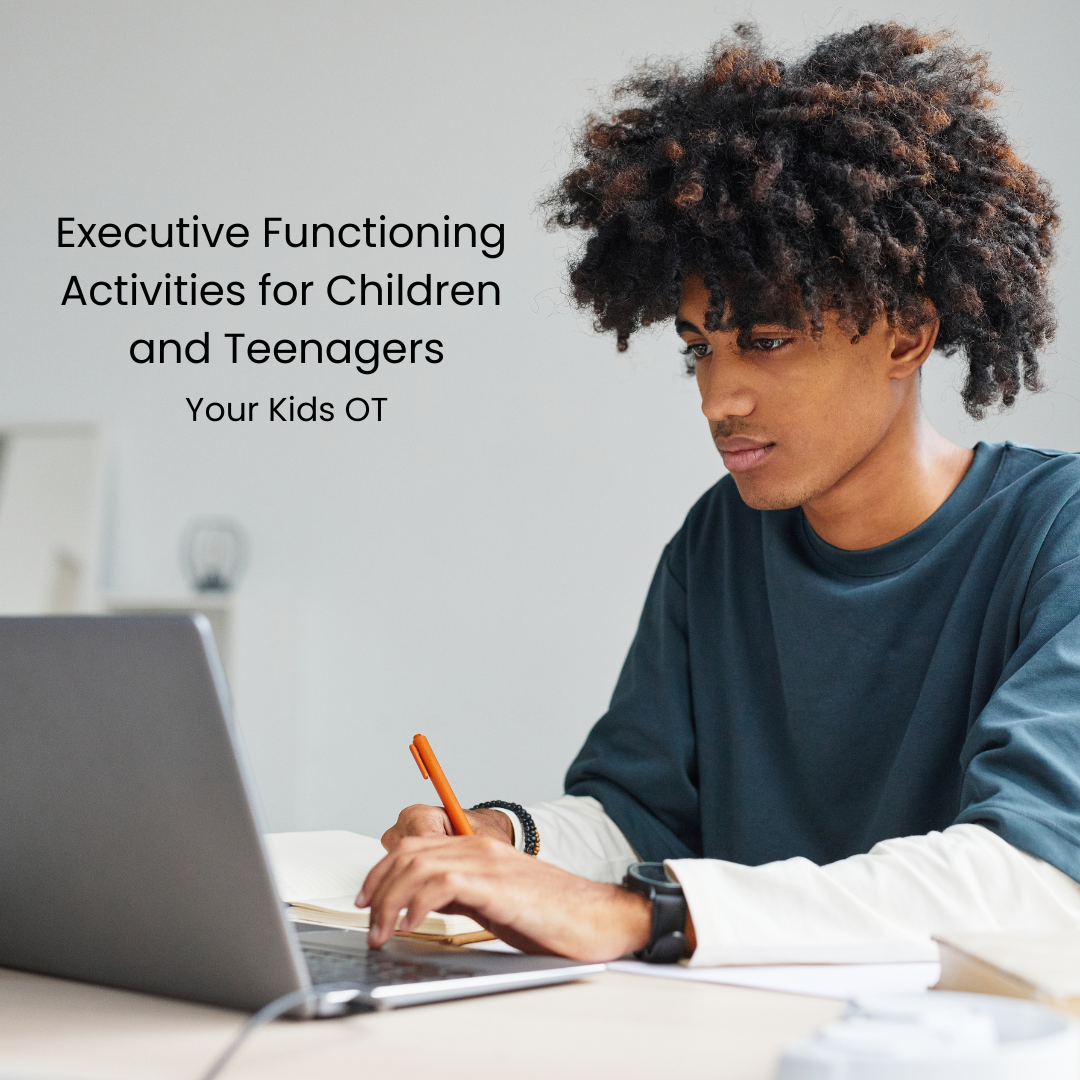All activities need executive functioning skills.
We need to know the goal (ie. the challenge, the purpose, the point).
We need to know the plan (ie. what equipment do we need to organize, what are the steps and the sequence, what previous knowledge or experience can we use to help us).
We need to do the actions (ie. get started, use one’s body, being aware of time, persisting and finish what we have started).
We need to check (ie. did we do the what we were supposed to do, do we need help).
I’m not a fan of executive functioning “workbooks” on their own. While they have a place in helping children work through their cognitive skills needed for executive functioning, they can be limited in actually putting these skills into practice.
In occupational therapy, we aim to help a child to break down a task (ie. activity analysis) to make sure the components of executive functioning are addressed.
To support the process, consider using the goal setting sheets HERE and we work through the goal, plan, do check framework.
1) Goal: Challenge Activity. For each activity we talk about and write the goal (so the child is clear about what they are doing). It is not imperative that the child does the writing.
2) Plan: Equipment. The child identifies the equipment/physical things that are needed. If a child doesn’t name all the items, we move but I highlight with strategic questioning what is missing. This will come up as we start the sequence of steps.
3) Plan: Steps. You can either ask your child to name all the steps and then do them to see if anything is missing. I prefer to ask the child to write down one step and then perform that step. This encourages perseverance and checking straight away if any steps are missing or in the wrong order. It keeps the child engaged and focused when naming all the steps may be beyond their ability to plan in one go. It also helps with motivation for handwriting.
4) Check: Review. I ask the child to reflect on their experience of doing the activity or challenge. Was it easy, medium or difficult? Did they start it, keep going and finish the activity? Would they do the activity again? What advice would they give themselves before doing it again? Would they change anything.
In therapy sessions I love to use crafts, self care tasks and gross motor challenges. You can increase the difficulty of the tasks with the age of your child. You may also chose simpler tasks for children who become easily frustrated or have difficulties with multiple step instructions. For older children, we may have more complex tasks that take multiple weeks to complete.
Here are a few activity suggestions:
CRAFTS
- Make a paper plane
- Make a fortune teller
- Make a paper bag puppet
- Make an origami animal
- Make playdough
- Make a fidget toy (eg. calm down jar, beaded bracelet, stress ball)
- Make a collage that represents a picture of you
- Draw a comic
- Draw a plan of your bedroom
SELF CARE TASKS
- Make a sandwich
- Make a milkshake
- Make a fruit salad
- Make a fruit skewer
- Tie shoe laces
- Blow your nose
- Wash your hands
- Pack your bag for school
- Pack away the toys in the appropriate containers
- Brush your teeth
- Tie a braid in your hair
- Tie a pony tail in your hair
- Cut your finger/toe nails
- Paint your finger/toe nails
- Sort the cutlery into the drawer
- Set the table for dinner
- Sort the plates/cups according to size
PLAY
- Tricky fingers fine motor game (with challenge cards)
- Sort playing cards in suits (or Uno cards into colours)
- Shuffle cards and deal out 5 cards per person
- Create an obstacle course
- Create an activity dice (ie. different activity on each side of the dice)
- Invent a new game using certain items
- Play a card game or board game (eg. Twister, Battleship, Bingo, Uno, Sleeping Queens, Sushi Go, etc)
- Create a board game
- Lego Challenge or Wikki stix challenges
GROSS MOTOR CHALLENGES
- Work out the quickest way to move a box of books from one end of the room to another?
- Work out how many jumps would it take to increase your heart rate?
- Work out which yoga pose you can hold for the longest time?
- Work out is it easier to balance on one foot with your eyes open or closed?
- Work out which of your arms is stronger?
- Work out which leg can kick a ball the furthest?
SCHOOL CHALLENGES
- Sort out worksheets by subject into a binder (folder).
- Find the stationery around the room that is needed for a pencil case.
- Sort stationery according to type or colour.
- Work out which markers (textas) are still working and keep them together.
- Organise a bookshelf so the books are in alphabetical order by title.
- Organise a bookshelf so the books are in alphabetical order by author’s surname.
- Decorate/Cover your school book
- Rule a margin in the first 5 pages of your workbook
- Create a checklist for what you need for school each day
- Create a cartoon
- Create a puppet show
- Place a post it note on every 5th page of an exercise book as a tab. Make sure it can be seen at the top or side of the page. Label each post it note (eg. letters of the alphtabet, subjects at school, friends names, recipe options, etc) Use the exercise book to record information that mataches the labels.
OLDER CHILDREN/TEENAGERS
- Plan a meal for dinner.
- Plan the family’s dinner schedule for a week.
- Plan a day trip to visit a public place via public tranport.
- Plan a packing list for a camping trip.
- Plan a holiday with a certain budget.
- Plan a schedule for looking after a family pet.
- Create a table with information about each subject, room location/s, teacher.
- Draw a timetable of your week including school, travelling time, extra curricular activities.
- Draw a 24 hour chart of how you spend your time.
- Work on a group project with peers to build a house model.
- Work on a group project with peers to create a dance.
- Work on a group project with peers to present to the class on a topic.
- Use your diary to write in upcoming assessment tasks.
- Plan the stationery you need for a test.
- Create a model of your bedroom using Lego.
- Create a model of your classroom using cardboard.
- Design a computer game.
Remember it is about the process rather than the product (ie. end result of doing these tasks)!
Many of these tasks are important functional tasks that we may expect that our children can do. Helping them with the process of developing executive functioning skills is the aim to allow transference of skills to other activities.
- Traffic light framework for understanding and explaining executive functioning skills
- Visual supports for identifying specific areas of executive functioning difficulties
- Practical parent tips for children
- Practical parent tips for teenagers
- Teenager self awareness checklist with practical tips
This product is also available at the YKOT TPT Store.
Have you tried teaching executive functioning skills as a process? I would love to hear your feedback on this!
Until next time,














